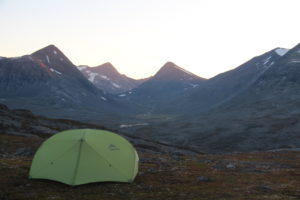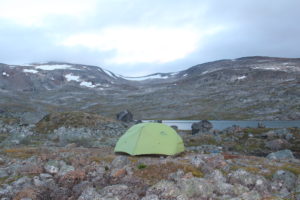So, lets talk some about the “home away from home” – choosing the right tent is worth some thought, evaluation and due diligence as most people don’t want to acquire a bunch of different tents for different purposes. A good tent is quite and investment for most of us!

As we´re all about hiking on this blog I’m just presuming that weight matters to You as well, there’s not much fun carrying more than necessary (unless You feel the need to punish Yourself for something…). On the other hand there´s an inverse relationship between weight and price and, just as with other gear, the real light weight stuff can be ridiculously pricy.
One more thing to consider is the comfort of having a slightly larger, and therefore heavier, tent – especially on longer tours when it can be expected to get wet some of the days.
Personally I don’t mind using a 1-person tent for shorter tours while I definitely prefer a larger tent on my longer hikes, and even willingly carry an extra gear shed, that can be hooked on to my tent, when going out for two weeks or more. The comfort of never having to worry about wet gear inside the tent is totally worth the extra 900g (2lbs) in my pack.
Besides size, weight and price we have two basic models to consider:
- Dome tents
- Tunnel tents
 Which to choose is basically up to Your preferences, though there are a few advantages to both models that might influence which one suits Your needs best.
Which to choose is basically up to Your preferences, though there are a few advantages to both models that might influence which one suits Your needs best.Dome tents are self supporting, making them ideal for camping on surfaces where tent pegs are hard to use, like cliffs, very hard soil or sand. On the other hand they are mostly a little heavier than a tunnel tent of the same size and You can only sit upright close to the center. Most dome tents have two apses, providing the comfort of keeping backpacks on one side and using the other as entrance. They’re also ridiculously easy to pitch as You only need to insert the poles into the marked channels and fasten them, which all is rather self evident.
A tunnel tent need a little more ”getting used to” and I definitely recommend raising it a few times at home to make sure You know what goes where, I remember one year hiking with a friend who just bought a new tent and pitched it for the first time that first evening of the hike. I had my tent pitched, a pot of tea ready and was quite amused watching the struggle he went through getting all the lines in place and tightened.
Once You know what You’re doing, though, its all smooth sailing and the lower weight is an advantage on longer hikes (on weekend trips the weight doesn’t really matter that much as the pack is rather light anyway).
Please don’t expect me to recommend any particular brand here, as not all are available everywhere, and there are a ton of great tent manufacturers out there. Just let me say that if You want to be serious about You hiking and get really of the grid in regions where weather might get rough, You should definitely stay away from the lower end of the spectrum. There are some tents out there that are considerably less price than the high end stuff, and they might work excellently in the back yard or even in woodlands, yet there is a reason for the lower price and I would not risk saving on this important piece of gear if You wanna go into the mountains anywhere in the world.
I hope this article is helpful to you in choosing your equipment, please leave a comment and let me know, ok?
Thank You so much for checking out my blog, please share this with friends and loved ones who might benefit or be interested!
By leaving Your name and email in the box below You get notification of futures posts and news!
Peace // Claes